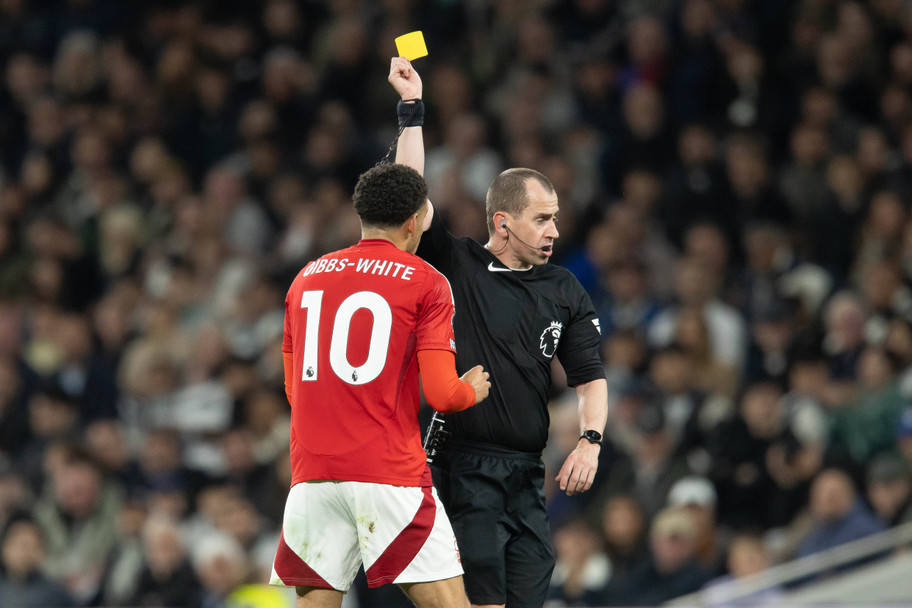Cautionary tale: Understanding booking points and the card market in football betting

The world of football betting extends far beyond traditional match outcomes. One particularly exciting market that has gained popularity among seasoned bettors is the booking points or card market.
This alternative betting option focuses not on goals or winners, but on disciplinary actions during a match.
Love football? Find the best football betting sites and bet with welcome bonuses today.
What makes the booking points market especially intriguing is its independence from the scoreline. Even in a one-sided match with minimal goal-scoring excitement, the card market remains active until the final whistle.
A seemingly mundane 0-0 draw can become a rollercoaster of emotions for those who've wagered on disciplinary outcomes.
Unlike goal markets which primarily reward knowledge of attacking prowess and defensive stability, the card market rewards those who understand the psychological aspects of football—the personalities of players and referees, the emotional temperature of derby matches, and the desperation that sets in during crucial late-season fixtures.
It's a market where understanding human behaviour can be as valuable as statistical analysis, and a fascinating part of learning how to bet on football.
What are booking points?
Booking points are a numerical representation of the disciplinary actions that occur during a football match. When a referee shows a card to a player, it translates into a specific number of booking points. The standard values are:
- Yellow card: 10 booking points
- Red card: 25 booking points
- Second yellow card leading to red: 35 booking points (10 for the first yellow + 25 for the red)
It's worth noting that these values can vary slightly between bookmakers. Some use different point systems, such as one point for yellows and two for reds, or three for yellows and five for reds.
Bettors should always check the specific rules with their chosen bookmaker before placing any bets.
Types of card market bets
The booking points market offers various betting options and in this section, we will start by discussing the total booking points. This is the most straightforward bet, where you predict whether the total booking points in a match will be over or under a specified threshold.
For example, if the line is set at 35.5 points, you're essentially betting on whether there will be more or less than three yellow cards (or equivalent) in the match.
Another type of card market bet is represented by team booking points. This means that instead of betting on the total for both teams, you can focus on the booking points for a specific team.
This can be advantageous if you've identified a team with disciplinary issues or one facing a particularly strict referee.
For those with deeper insights however, betting on specific players to receive cards can be lucrative. Players with aggressive playing styles, those tasked with marking star opponents, or defenders struggling with pace are often good candidates for card bets.
First/last card is another tactic whereby you can bet on which team will receive the first or last card in a match, adding another dimension to your betting strategy.
Factors influencing the card market
To make informed decisions in the booking points market, consider a number of key factors such as referee tendencies, derby matches and high-stakes games, as well as tactical fouls, or playing styles.
Perhaps the most crucial factor when it comes to booking points is the referee and their track record.
Each official has their own style and threshold for issuing cards. Some are quick to reach for their pocket, while others prefer to manage games through verbal warnings. Researching referee statistics can provide valuable insights.
For instance, in the 2022/23 Premier League season, David Coote averaged 4.36 yellow cards per game, while Robert Jones averaged just 2.94. That's a significant difference that could impact your betting strategy.
Maybe we'll have a xC [expected cards] before too long and not just analysing 'expected goals' metrics.
When it comes to local derbies, crucial end-of-season fixtures, and matches between fierce rivals typically see more intense challenges and emotional reactions, leading to more cards.
The Manchester derby, north London derby, and Merseyside derby historically feature higher booking points than average league games.
As with most types of betting, playing styles are essential for forming a coherent betting strategy.
Teams with aggressive, pressing styles, or those that frequently counter-attack can draw more fouls and cards. Similarly, teams that hold possession for long periods may frustrate opponents, leading to rash challenges.
Clubs fighting relegation or defending a narrow lead often resort to tactical fouls to break up play, especially against technically superior opponents. These situations frequently result in bookings.
Individual player disciplinary records should also be taken into account when it comes to booking points strategies.
Some players are card ‘magnets’ due to their playing style or temperament. Tracking these players and betting on them to receive cards can be a profitable strategy.
Advanced strategies for card market betting
The card market is particularly suited to in-play betting so if you notice increasing tension in a match, frustrated players, or a referee beginning to lose control, the likelihood of cards increases. This presents valuable live betting opportunities.
Bettors should also consider how match circumstances might affect card distribution. For example, short-priced value selections and teams chasing a game in the final minutes often commit desperate challenges.
In the tense 2021/22 Premier League relegation battle between Everton and Burnley at Turf Moor, Burnley's desperate final minutes perfectly illustrated how chasing a game can lead to reckless challenges. Trailing 2-1 with just five minutes of regular time remaining, Burnley's players abandoned their typical discipline as panic set in.
Defender James Tarkowski earned a yellow card for a reckless lunge during an Everton counter-attack, followed quickly by Josh Brownhill's dangerous slide tackle on Richarlison.
The pressure continued mounting through stoppage time, with Wout Weghorst also receiving a booking for a frustrated shove after losing an aerial duel.
In total, Burnley collected three yellows and committed multiple fouls in the final minutes, demonstrating how the psychological pressure of needing a late equaliser in a relegation six-pointer can transform even disciplined teams into card magnets through sheer desperation.
On the other hand, early goals can sometimes reduce card counts as the losing team loses motivation.
For instance, When Sheffield United visited Liverpool during their struggling 2020/21 Premier League campaign, the impact of early goals on card frequency became clearly evident.
Despite averaging over two yellow cards per game that season with their typically combative style, the Blades’ motivation visibly diminished after Liverpool scored twice within the first 23 minutes through Fabinho and Roberto Firmino.
What started as an aggressive game plan designed to frustrate the hosts quickly transformed into a more restrained approach, with United's players noticeably pulling back from risky challenges and intense pressing.
By the final whistle, they had received just a single yellow card - well below their season average - despite Liverpool's dominant 60% possession.
This match perfectly illustrated how early goals can psychologically impact players, who subconsciously conserve energy and avoid frustration-driven fouls when a game feels effectively decided, especially when they have more winnable fixtures against relegation rivals on the horizon.
Bankroll management
As with all betting, proper bankroll management is essential. The card market can be volatile, so keeping stake sizes consistent and avoiding chasing losses is crucial for long-term success.
What makes the booking points market especially intriguing is its psychological component. Unlike goals, which depend on skill and sometimes luck, cards often stem from emotional reactions, frustration, and gamesmanship.
Understanding the psychological aspects of football - how players react under pressure, which personalities clash, and how tensions escalate - can give bettors an edge that pure statistical analysis might miss.
An emerging market ready to go mainstream?
The booking points market represents an exciting alternative to traditional football betting. It rewards deep knowledge of the game's nuances, referee tendencies, and player psychology.
While it might seem complex initially, understanding the factors that influence card distribution can open up profitable betting avenues.
As with any form of betting, success requires research, discipline, and a strategic approach. By developing expertise in this niche market, bettors can find value that others might overlook.
Whether you're a seasoned bettor looking to diversify your portfolio or a newcomer intrigued by this alternative market, booking points betting offers a fascinating way to engage with football beyond goals and results.
Just remember to bet responsibly and enjoy the additional dimension it brings to your football watching experience.
Responsible gambling with FIRST
You must be 18+ to gamble. Gambling is a form of entertainment, not a way to make money. Our tips and advice help you enjoy gambling, but there is always a chance a bet or casino game can lose.
Never bet more than you can afford to lose. Stop betting if you are angry, emotional or under the influence of alcohol.
Warning signs of problem gambling: chasing losses, betting money needed for bills, or feeling unable to stop.
Need help? Visit our responsible sports betting page or our responsible casino gambling page, or contact the support organisations listed below if you're struggling to control your gambling:






 Understanding variance in betting: Why even good bettors experience losing streaks
Understanding variance in betting: Why even good bettors experience losing streaks
 Starting small: Why micro-stakes betting is perfect for beginners
Starting small: Why micro-stakes betting is perfect for beginners
 Premier League relegation odds: The clubs, the myths, the legends
Premier League relegation odds: The clubs, the myths, the legends
